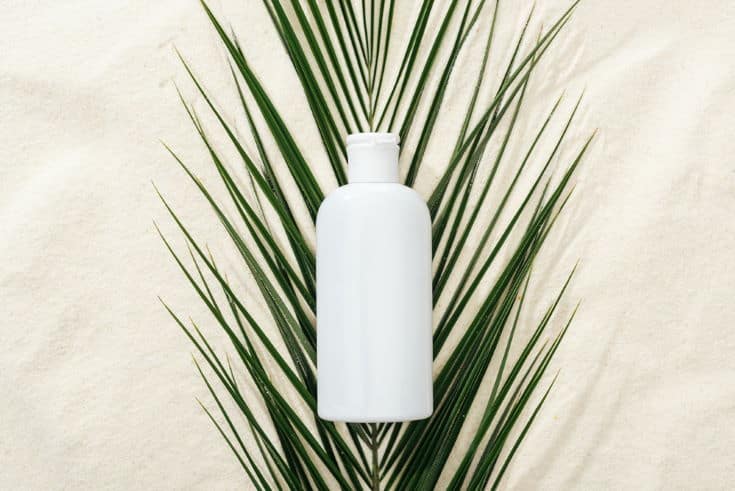There is a whole craze around the concept of using natural products. Bamboo toothbrushes, plant-based soap, natural sunscreen… But even if people are making an effort to save the planet and go green, one can’t help but wonder if the natural version of certain products is actually better than the conventional one. And sunscreens are often part of the controversy. So, if you’re in the store in front of a shelf and had to choose between a natural sunscreen vs regular sunscreen, which would you opt for?
Natural Sunscreen VS Chemical Filled Ones Comparisons
| Natural Sunscreen | Chemical-Filled Sunscreen |
|---|---|
 |
 |
|
|
Natural Sunscreen

Ingredients
There are plenty of speculations regarding whether the word “natural” is used correctly when associated with sunscreen. That’s because the main ingredients in natural sunscreens are minerals that come from the earth, hence the use of the term. So, why use natural sunscreen?
Generally speaking, it contains zinc oxide, titanium dioxide, or a combination of both that stand as active ingredients in the formula. While the ingredients in chemical sunscreens act by absorbing the sun’s rays, natural sunscreens create a rather protective barrier that shields the skin and protects it from the sun.
Efficiency
According to Consumer Reports who tested out a variety of different natural sunscreens, only a few of them were rated as being extremely good and efficient in protecting the skin against UV radiation. It’s important to mention that good sunscreen needs to have a broad-spectrum coverage, meaning that they should protect the skin against UVA and UVB rays as well.

While natural sunscreens are considered to be efficient, evidence suggests that they might not be as efficient as conventional ones. Tests have revealed the fact that about 85 percent of the SPF listed on the labels of the products in question was actually favorable.
Safety
Early in 2019, the FDA stated they were working on a new regulation that could declare mineral sunscreens as being safe. Specifically, the two active ingredients that are found in these types of sunscreens (zinc oxide and titanium dioxide) are safe, while the 12 most common ingredients in conventional sunscreens require more tests.
Natural sunscreen is also considered to be a safer option for children, and although no actual children testing has been performed in order to determine the veridicality of the statement, it is best for parents to choose the safest options, while also taking into account that children need a really high SPF factor and broad-spectrum protection.
Chemical-Filled Sunscreen

Ingredients
What makes traditional sunscreens a subject for controversy is the fact that they contain ingredients that could affect the body’s hormone production. One of the main ingredients in plenty of conventional sunscreens is oxybenzone, which has been linked to a decrease in sperm quality, skin allergies, cell damage, and hormone disruption.
People believe that conventional sunscreen has plenty of dangerous ingredients, such as octyl salicylate, homosalate, methoxycinnamate, avobenzone, or ecamsule. However, the FDA believes that chemical sunscreen still needs more research before it can actually be considered harmful.
Efficiency

The short answer is yes. In fact, some dermatologists suggest that chemical sunscreens might actually be more efficient compared to its natural counterpart. Whether that statement is true or not is a subject that’s still up for research, so we still need more evidence if we are to pick a favorite.
One of the main differences between the efficiency of natural sunscreen compared to conventional one is that conventional sunscreen will test much higher in SPF variation tests. The variation from SPF is a test that shows how close the SPF mentioned on the label actually reflects the real protection level that a product can offer.
General consensus and the tests that have been performed so far suggest that chemical sunscreen is potent and efficient. However, there are certain rules to keep in mind if you want your natural or conventional sunscreen to be efficient, like the fact that no sunscreen is waterproof. That means that regardless of the type of sunscreen you choose, you should reapply it every two hours even if you didn’t sweat or swim during this period. It’s the best way to make sure that every inch of your skin is actually protected from harmful sun radiations.
Safety

This is a very delicate topic to address because findings have tilted the balance in favor of natural sunscreens, then conventional ones, then back to natural sunscreens. This makes it difficult for people to actually give a verdict on what’s safe and what’s not.
Here is what you need to know. The ingredients in chemical sunscreens which are suspected of being unsafe are absorbed in the body’s bloodstream. Because of that, the FDA has to regulate and test these products for safety. In February 2019, the FDA issued a statement saying that mineral-based sunscreens are safe, while conventional ones require further testing.
The true effects of the ingredients in chemical sunscreens are a subject up for debate, so we’ll have to sit tight and check the FDA’s news on the topic.
Conclusion
Choosing between natural and chemical sunscreen is very tricky. No, I mean VERY tricky. While there are some bits of research that link the ingredients in conventional sunscreen to certain medical problems, dermatologists seem to believe that sunscreen actually exposes you to a very low quantity to actually make a negative impact. Instead, the benefits of using any type of sunscreen outweigh heavily the risks of not using one at all. Be it natural or chemical-filled, just buy one!
The post Natural Sunscreen VS Chemical Filled Ones: The Main Differences appeared first on Better Mind Body Soul.
No comments:
Post a Comment